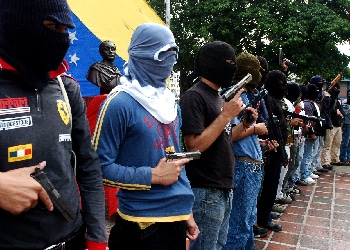saintgeorgesflushing.org – Venezuela, once the wealthiest country in South America, has been grappling with a severe economic crisis that has led to widespread poverty, hyperinflation, and a dramatic increase in crime rates. The country’s economic collapse is a complex issue, rooted in a combination of factors including government mismanagement, reliance on oil revenues, and international sanctions. This article explores the intertwined relationship between Venezuela’s economic downfall and the rise of crime, examining the impact on its citizens and the broader implications for the region.
The Economic Collapse
Venezuela’s economic crisis began to unfold in the mid-2010s, exacerbated by a significant drop in global oil prices. As the country’s economy is heavily dependent on oil exports, the decline in revenues led to a sharp contraction in the GDP. The government’s response to the crisis, characterized by currency devaluation and the printing of more money, resulted in hyperinflation, estimated to exceed 1,000,000% in 2018. This economic turmoil has had devastating effects on the population, with basic goods becoming unaffordable and widespread shortages of food and medicine.
The Rise of Crime
As the economic situation deteriorated, Venezuela saw a significant increase in crime rates. The collapse of the economy has led to a breakdown in law and order, with many citizens struggling to survive. The lack of employment opportunities and the inability to afford basic necessities have pushed many into the informal economy, including criminal activities.
Violent Crime
Venezuela has one of the highest homicide rates in the world, with violent crime being a daily reality for many citizens. The economic crisis has fueled this violence, as desperate individuals turn to robbery, kidnapping, and other forms of crime to support themselves and their families. The government’s inability to maintain security has also emboldened criminal gangs, who operate with relative impunity in many areas.
Corruption and Organized Crime
The economic collapse has also been accompanied by rampant corruption and the rise of organized crime. The breakdown of institutions has allowed corrupt officials to exploit the situation for personal gain, while criminal organizations have taken advantage of the chaos to expand their operations. The smuggling of goods, drugs, and even fuel has become a significant source of income for these groups, further destabilizing the country.
The Human Impact
The combination of economic collapse and increased crime has had a profound impact on the Venezuelan population. Many citizens live in fear, unable to leave their homes without the risk of being robbed or worse. The lack of security has also led to a humanitarian crisis, with millions of Venezuelans fleeing the country in search of safety and stability.
International Implications
Venezuela’s economic collapse and crime wave have significant implications for the region and the international community. The influx of migrants has placed a strain on neighboring countries, while the instability has the potential to spread. The international community has been divided on how to address the crisis, with some countries imposing sanctions and others offering humanitarian aid.
Conclusion
Venezuela’s economic collapse and the rise of crime are deeply interconnected issues that have had devastating consequences for the country’s population. The situation highlights the importance of economic diversification, good governance, and the rule of law. As Venezuela continues to grapple with these challenges, the international community must remain engaged, providing support and seeking solutions that can help the country recover and ensure the safety and well-being of its citizens.
